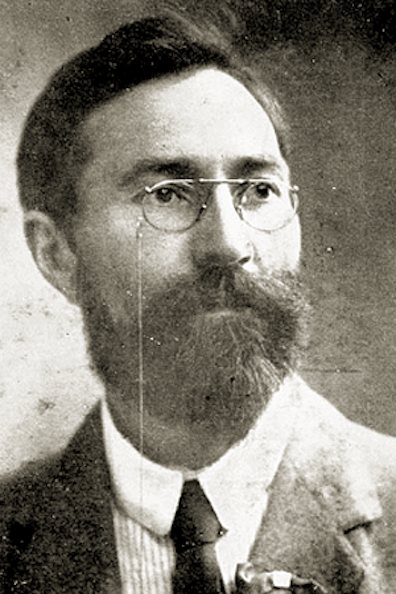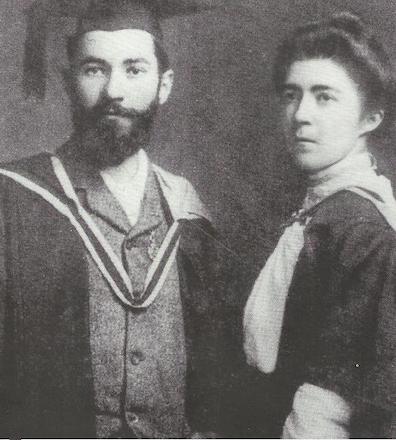The many appearances of McCann in Stephen Hero are
pared to a single scene in A Portrait. There he is a
political activist—he is called a "propagandist" at one
point—who with "flushed bluntfeatured face" is rounding up
signatures on a "testimonial." Cranly says it is for universal
peace and Moynihan says it's for a "Bravenew world. No
stimulants and votes for the bitches." In an effort to get
Stephen to sign, MacCann "began to speak with fluent energy of
the Csar's receipt, of Stead, of general disarmament,
arbitration in cases of international disputes, of the signs
of the times, of the new humanity and the new gospel of life
which would make it the business of the community to secure as
cheaply as possible the greatest possible happiness of the
greatest possible number." Stephen declines, prompting MacCann
to call him a "reactionary." As Stephen politely differs and
walks away, MacCann says that he has "yet to learn the dignity
of altruism and the responsibility of the human individual."
This portrait seems faithful to the political affiliations of
Skeffington, whose causes included pacifism, socialism,
feminism, vegetarianism, and opposition to "stimulants" like alcohol and tobacco. But by representing
only one sharp-edged intellectual exchange it obscures other
qualities which strongly attracted Joyce to Skeffington. The
two men were friends, as Stephen Hero makes clear,
and Fargnoli and Gillespie note that "With the exception of
himself, Joyce considered Skeffington the cleverest man at
University College, Dublin." After his marriage in 1903
"Skeffy" worked as a journalist, supported by his wife's
teaching job, and compiled a substantial record in publishing.
He edited or co-edited the Nationalist (with Tom
Kettle), the Irish Citizen, and the National
Democrat (with Fred Ryan)
and wrote pieces for various newspapers and magazines. His
book-length biography of Michael Davitt was published in 1908,
and his novel In Dark and Evil Days was published
after his death in 1916.
Skeffington supported Home Rule and sympathized with some of
the militants agitating for Irish independence, but he
categorically renounced violence. When the Rising began in
April 1916 he avoided the fighting but organized volunteers to
stop poorer citizens from looting shops. Arrested on the
streets by British soldiers, he was taken to the Portobello
Barracks and executed by firing squad the next day. His murder
was probably not due so much to government or army policy as
to the blood lust of one minor officer. Captain John
Bowen-Colthurst, a decorated Cork-born officer in the Royal
Irish Rifles who had seen action in South Africa, Tibet, and
France, seems to have snapped during the street fighting in
Dublin. In addition to his order to kill Skeffington and two
other journalists, Colthurst himself shot other Dublin
residents in the streets without any justification. He was
arrested on May 6, court-martialed on June 6, found guilty but
insane, and sentenced to the Broadmoor Lunatic Asylum for one
year.
The story was a bitterly sad one for Colthurst, for the
commanding officer who reported him, and not least for Sheehy
Skeffington and his wife and young son. Ellmann records that
Joyce "followed the events with pity; although he evaluated
the rising as useless, he felt also out of things. His
attitude towards Ireland became even more complex, so that he
told friends, when the British had to give up their plans to
conscript troops in Ireland, 'Erin go bragh!' and
predicted that some day he and Giorgio would go back to wear
the shamrock in an independent Ireland" (399). The sadness
continued when Tom Kettle, Skeffington's journalistic
collaborator and brother-in-law, was killed while fighting in
France. Kettle was one of those Irishmen who volunteered to
serve in the army in the hope that Britain would later
reciprocate by giving Ireland home rule. The impulse was
generous but naive: it would have been wiser for politicians
to try bartering service in exchange for independence.
Elllmann records that when Joyce returned to Dublin in 1909
he "ran into Francis and Hanna Sheehy Skeffington. Skeffington
wanted to be friends, and seemed to have forgotten, as Joyce
had not, his refusal to be friendly in October 1904. He
pronounced Joyce 'somewhat blasé,' but Hanna said he was not a
bit changed. Joyce treated them coolly, as befitted an old
debtor with an old creditor, and subsequently refused an
invitation to dine" (278).


